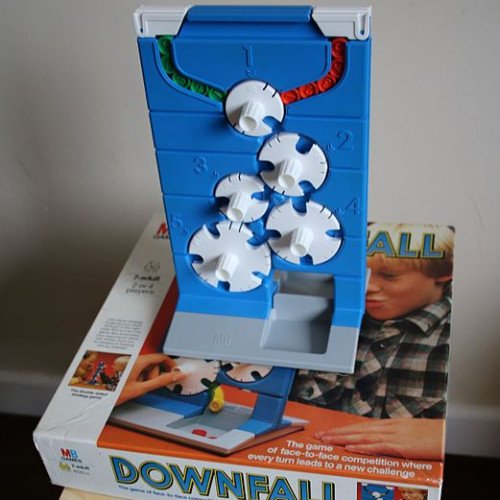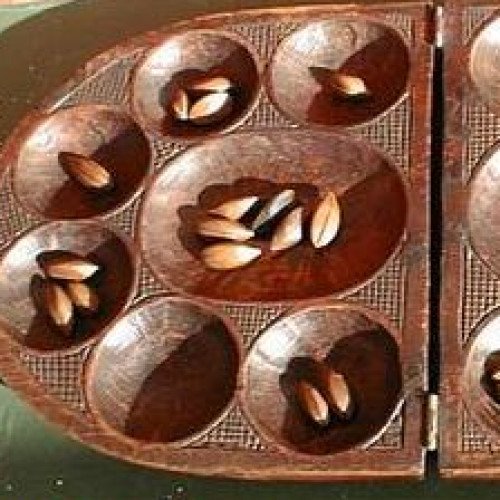DOWNFALL VS OWARE

DOWNFALL
Downfall is a two-player game for players aged 7 and older, first marketed by the Milton Bradley Company in 1970. The game consists of a vertical board with five slotted dials on each side. Each player starts with ten numbered tokens or discs at the top of the board. The object of the game is to move the discs to the bottom of the board by turning the dials. Players alternate turns moving the dials and cannot move a dial that their opponent has just moved. The winner is the first player to move all of their discs into the tray at the bottom. An advanced version of the rules dictates that the discs arrive in the tray in numerical order. Since neither player can see the other's board, it is common to inadvertently advance - or hinder - the opponent's gameplay. The game rewards forward thinking and planning; players may try to "trap" their opponent into turning a dial that will advance their own disc, while trying to ensure that their own discs are not caught and dropped out of order. The game is currently available in the UK under the name New Downfall, manufactured and marketed by Hasbro. The new version follows the same rules but has a more futuristic design in red and yellow. The game's box art is parodied on the cover of Expert Knob Twiddlers, an album by Mike & Rich (Mike Paradinas & Richard D. James).
Statistics for this Xoptio

OWARE
Oware is an abstract strategy game among the Mancala family of board games (pit and pebble games) played worldwide with slight variations as to the layout of the game, number of players and strategy of play. Its origin is uncertain but it is widely believed to be of Ashanti origin. Played in the Bono Region, Bono East Region, Ahafo Region, Central Region, Western Region, Eastern Region, Ashanti Region of Ghana and throughout the Caribbean, Oware and its variants have many names - Ayò, Ayoayo (Yoruba), Awalé (Ivory Coast, Benin), Wari (Mali), Ouri, Ouril or Uril (Cape Verde), Warri (Caribbean) Pallanguzhi (India) Wali (Dagbani), Adji (Ewe), Nchọ/Ókwè (Igbo), ise (Edo), Awale in (Ga) meaning Spoons in English according to the Ga name for the game. A common name in English is Awari but one of the earliest Western scholars to study the game, Robert Sutherland Rattray, used the name Wari. The game requires an oware board and 48 seeds. A typical oware board has two straight rows of six pits, called "houses", and optionally one large "score" house at either end. Each player controls the six houses on their side of the board, and the score house on their end. The game begins with four seeds in each of the twelve smaller houses. Boards may be elaborately carved or simple and functional; they may include a pedestal, or be hinged to fold lengthwise or crosswise and latch for portability and storage with the seeds inside. While most commonly located at either end, scoring houses may be placed elsewhere, and the rows need not be straight. When a board has a hinged cover like a diptych, the scoring houses may be carved into the two halves of the cover, and so be in front of the players during play. The ground may also be used as a board; players simply scoop two rows of pits out of the earth. In the Caribbean, the seeds are typically nickernuts, which are smooth and shiny. Beads and pebbles are also sometimes used. In the West, some cheaper sets use oval-shaped marbles. Some tourist sets use cowrie shells. The game starts with four seeds in each house. The objective of the game is to capture more seeds than one's opponent. Since the game has only 48 seeds, capturing 25 is sufficient to win the game. Since there is an even number of seeds, it is possible for the game to end in a draw, where each player has captured 24.